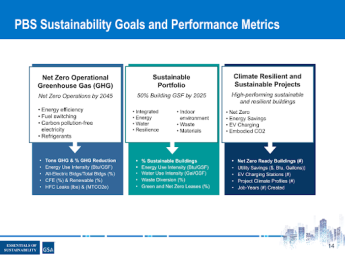Principled Approach to Sustainable Buildings
by Rich Stebbins
A core value within Region 8 is the focus on sustainability and ways to positively impact the environment while saving taxpayer money.
The Region 8 Sustainability Team is implementing different technologies and strategies to help save energy and reduce greenhouse gases to make all regional buildings high performing sustainable buildings.
To assist that team, the Council on Environmental Quality has drafted some guiding principles focused on key criteria to not only deliver energy savings but also keeps tenant satisfaction in mind. These guiding principles also align with and support Outcome #2: Aim for Net Zero in the Public Buildings Service strategic plan.
“The federal guiding principles for sustainable buildings help us meet federal mandates related to sustainable design, construction, and operations of buildings,” said Lisa Haskins, Sustainability Supervisory Team Lead. “The guiding principles help us conserve critical resources and increase facility climate resiliency as well as tenant comfort.”
Energy optimization in building operations will be key to meeting existing sustainable building compliance and net zero goals. The recently adopted Federal Buildings Performance Standard has established an incremental decrease in building energy use to meet 2030 energy reduction goals.
Region 8 is focusing on 16 buildings in its footprint that are responsible for 77% of its greenhouse gas emissions. Energy subject matter experts, building management and Operations and Maintenance contractors are partnering on energy and water saving solutions to have the greatest impact in these energy intensive buildings.
Advanced metering, building automation systems, and fault detection software have been installed to track electricity, natural gas, water, and greenhouse gases (GHG) into an easily accessible dashboard. Within those guiding principles, Region 8 has made great strides. Energy use has been reduced by 38% since 2003, water use has dropped by 58% since 2008 and GHG emissions have decreased by 56% over 2008.
All of this is in preparation for the longer term goals of 65% GHG reduction by 2030 and net zero by 2045.
For more information on sustainability at the DFC, check out our We are Green series.

 U.S. General Services Administration
U.S. General Services Administration
